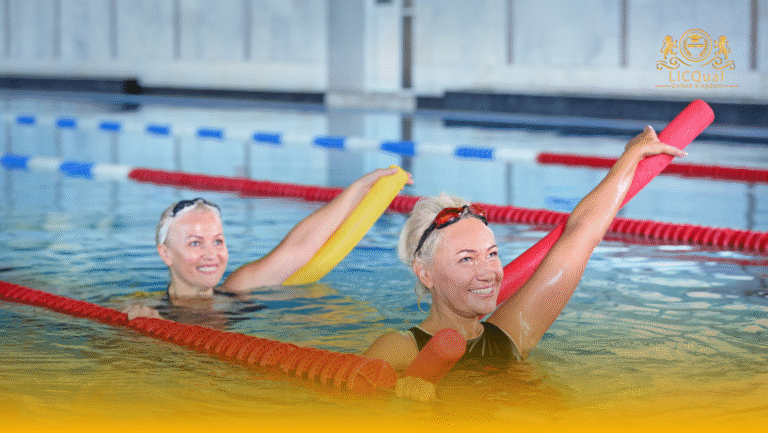The LICQual Level 6 Diploma in Aging and Nutrition (Dip Aging and Nutrition) is an advanced qualification designed for health and nutrition professionals seeking to specialise in the nutritional care of older adults. This diploma provides learners with in-depth knowledge of age-related physiological changes, nutritional requirements, and strategies to support healthy ageing. Learners will develop the skills needed to assess, plan, and implement evidence-based nutritional interventions that enhance the health, wellbeing, and quality of life of older adults.
This qualification is not intended for beginners. It is specifically tailored for learners who already possess professional experience in healthcare, nutrition, or allied disciplines and who are motivated to expand their expertise, improve leadership skills, and advance their Continuing Professional Development (CPD). Through this course, learners will gain the knowledge and practical tools required to deliver high-quality nutritional care, evaluate current research, and make informed decisions in a variety of care settings.
Centres delivering the LICQual Level 6 Diploma in Ageing and Nutrition must maintain the highest standards of teaching and learning. This includes employing competent and qualified staff, providing access to comprehensive and up-to-date learning resources, and ensuring a supportive and structured learning environment. By meeting these standards, centres enable learners to achieve their professional goals and maximise the impact of their practice in ageing and nutrition services.
Ideal for experienced practitioners aiming to specialize or take on leadership roles, this diploma equips learners with the knowledge, skills, and confidence to make a meaningful difference in the health and wellbeing of older adults.
Course Overview
Qualification Title
LICQual Level 6 Diploma in Aging and Nutrition (Dip Aging and Nutrition)
Total Units
6
Total Credits
120
GLH
480
Qualification #
LICQ2201093
Qualification Specification
To enroll in the LICQual Level 6 Diploma in Aging and Nutrition (Dip Aging and Nutrition), applicants must meet the following criteria:
|
Qualification# |
Unit Title |
Credits |
GLH |
|---|---|---|---|
|
LICQ2201093-1 |
Advanced Nutritional Science for Ageing |
20 |
80 |
|
LICQ2201093-2 |
Assessment and Monitoring of Nutritional Status in Older Adults |
20 |
80 |
|
LICQ2201093-3 |
Diet, Lifestyle, and Functional Ageing |
20 |
80 |
|
LICQ2201093-4 |
Nutrition for Special Populations in Ageing |
20 |
80 |
|
LICQ2201093-5 |
Research, Evidence-Based Practice, and Policy in Ageing Nutrition |
20 |
80 |
|
LICQ2201093-6 |
Leadership, Management, and Professional Development in Ageing Nutrition |
20 |
80 |
By the end of this course, learners will be able to:
Unit 1: Advanced Nutritional Science for Ageing
By the end of this unit, learners will be able to:
- Critically evaluate physiological and biochemical changes associated with ageing.
- Analyze the macro- and micronutrient requirements of older adults.
- Assess the impact of nutrition on cognitive function, immunity, and chronic disease.
- Apply evidence-based nutritional strategies to support healthy ageing.
Unit 2: Assessment and Monitoring of Nutritional Status in Older Adults
By the end of this unit, learners will be able to:
- Conduct comprehensive nutritional assessments, including anthropometric and clinical evaluations.
- Identify risk factors for malnutrition, obesity, and age-related health conditions.
- Analyse dietary patterns and their impact on health outcomes in older populations.
- Develop and implement personalised care plans based on assessment findings.
Unit 3: Diet, Lifestyle, and Functional Ageing
By the end of this unit, learners will be able to:
- Examine the relationship between diet, physical activity, and functional health in older adults.
- Promote healthy eating habits and lifestyle interventions to prevent age-related decline.
- Evaluate the effects of nutrition and lifestyle on mobility, independence, and quality of life.
- Integrate evidence-based approaches to optimise functional ageing.
Unit 4: Nutrition for Special Populations in Ageing
By the end of this unit, learners will be able to:
- Analyse the nutritional needs of older adults with chronic illnesses, cognitive impairments, or mobility limitations.
- Develop and implement specialised nutritional care plans for medically complex or vulnerable older adults.
- Evaluate ethical and professional considerations in providing specialised care.
- Collaborate effectively with multidisciplinary teams to achieve optimal nutritional outcomes.
Unit 5: Research, Evidence-Based Practice, and Policy in Ageing Nutrition
By the end of this unit, learners will be able to:
- Critically appraise current research and guidelines on ageing and nutrition.
- Apply evidence-based practice to inform planning and interventions.
- Evaluate relevant policies, standards, and best practices at national and international levels.
- Use research findings to support continuous improvement in nutritional care.
Unit 6: Leadership, Management, and Professional Development in Ageing Nutrition
By the end of this unit, learners will be able to:
- Demonstrate leadership and management skills in nutrition services for older adults.
- Implement quality assurance, risk management, and service improvement strategies.
- Engage in reflective practice and Continuing Professional Development (CPD) to enhance professional skills.
- Lead initiatives that ensure safe, effective, and high-quality nutritional care for older adults.
The LICQual Level 6 Diploma in Aging and Nutrition (Dip Aging and Nutrition) is designed for professionals and learners who want to specialise in nutrition for the aging population. This qualification is ideal for those seeking to enhance their expertise, gain professional recognition, or advance their career in geriatric nutrition, wellness, and healthcare. It is suitable for healthcare practitioners, dietitians, wellness advisors, and aspiring experts looking for a Level 6 diploma with practical and scientific relevance.
Healthcare and Allied Health Professionals
- Nurses and healthcare assistants specialising in elderly care
- Dietitians and nutritionists focusing on geriatric nutrition
- Public health practitioners working on aging population programs
- Professionals seeking an accredited Level 6 aging and nutrition diploma
- Practitioners aiming to implement evidence-based nutrition interventions
- Healthcare professionals seeking international recognition
Nutrition and Wellness Practitioners
- Geriatric dietitians providing nutrition advice to older adults
- Wellness consultants focusing on aging populations
- Health coaches integrating nutrition strategies for elderly clients
- Professionals pursuing advanced qualification in aging and nutrition
- Practitioners seeking LICQual international recognition
- Specialists applying science-based nutrition practices for healthy aging
Social Care and Support Professionals
- Care home managers and staff supporting elderly nutrition
- Social workers implementing dietary guidance for older adults
- Home care providers assisting with meal planning and feeding
- Professionals seeking Level 6 diploma in geriatric nutrition
- Staff aiming to improve quality of life through nutrition
- Individuals focusing on practical feeding strategies for seniors
Research and Academic Professionals
- Researchers supporting geriatric nutrition studies
- Academics teaching aging, dietetics, or wellness courses
- Individuals analysing age-related nutritional needs
- Professionals seeking Level 6 diploma for research progression
- Practitioners designing evidence-based nutrition interventions
- Learners aiming to enhance credibility in geriatric nutrition research
Career Changers and Aspiring Professionals
- Individuals transitioning into geriatric nutrition or wellness careers
- Graduates pursuing structured progression in aging and nutrition fields
- Professionals from related sectors seeking accredited geriatric nutrition qualifications
- Learners aiming for international Level 6 recognition for career advancement
- Career-focused individuals seeking practical and scientific expertise
- Those planning to enter elderly care, nutrition, or wellness sectors
Public Health and Policy Professionals
- Public health officers implementing nutrition programs for older adults
- Policy advisors supporting health and wellness initiatives for seniors
- Professionals contributing to national or community aging nutrition programs
- Learners seeking Level 6 qualification for public health or policy roles
- Practitioners interested in evidence-based aging nutrition frameworks
- Professionals aiming to influence public health and dietary policy
Professionals Seeking Academic and Professional Progression
- Learners planning further study in geriatric nutrition or health sciences
- Professionals seeking globally recognised qualifications for career growth
- Individuals aiming to strengthen expertise in aging nutrition practice
- Practitioners aspiring to senior roles in nutrition, wellness, or healthcare
- Learners seeking structured, research-informed professional development
- Professionals committed to long-term careers in aging and nutrition
Centres delivering the LICQual Level 6 Diploma in Ageing and Nutrition must meet the following standards to ensure high-quality training and learner success:
- Qualified and Competent Staff: Trainers and assessors must hold relevant professional qualifications and possess substantial experience in nutrition, healthcare, or elderly care.
- Comprehensive Learning Resources: Centres should provide access to current textbooks, research papers, case studies, and digital learning materials relevant to ageing and nutrition.
- Suitable Learning Environment: Classrooms, workshops, or online platforms must be safe, accessible, and conducive to effective learning.
- Practical Facilities: Learners should have access to clinical or simulated settings to apply practical skills in nutritional assessment and care for older adults.
- Assessment and Monitoring: Centres must implement robust assessment procedures, regular progress monitoring, and timely feedback to support learner achievement.
- Compliance and Safeguarding: Centres must adhere to all relevant health, safety, and safeguarding regulations to ensure a secure learning experience.
- Support for CPD: Centres should promote and facilitate Continuing Professional Development (CPD) opportunities to enhance learners’ professional growth.
- Technology and IT Access: Reliable access to computers, the internet, and relevant software is essential to support research, assignments, and digital learning activities.
Meeting these requirements ensures that learners receive high-quality, internationally standardized training, equipping them with the knowledge, skills, and confidence needed to excel in ageing and nutrition roles.
Assessment and Verification
All units within this qualification are subject to internal assessment by the approved centre and external verification by LICQual. The qualification follows a criterion-referenced assessment approach, ensuring that learners meet all specified learning outcomes.
To achieve a ‘Pass’ in any unit, learners must provide valid, sufficient, and authentic evidence demonstrating their attainment of all learning outcomes and compliance with the prescribed assessment criteria. The Assessor is responsible for evaluating the evidence and determining whether the learner has successfully met the required standards.
Assessors must maintain a clear and comprehensive audit trail, documenting the basis for their assessment decisions to ensure transparency, consistency, and compliance with quality assurance requirements.







